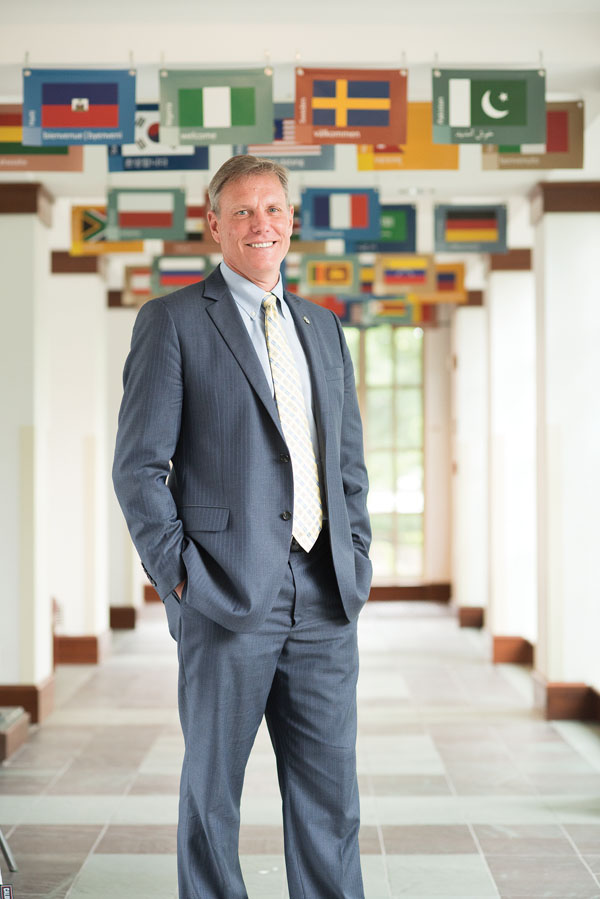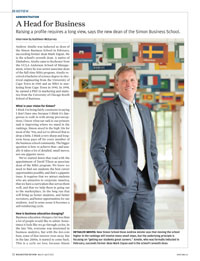In Review
 DETAILED MOVES: New Simon School Dean Andrew Ainslie says that moving the school higher in the rankings will involve many small steps, but the underlying principle is focusing on “getting our students great careers.” Ainslie, who was formally inducted in February, succeeds former dean Mark Zupan and is the school’s seventh dean. (Photo: John Smillie)
DETAILED MOVES: New Simon School Dean Andrew Ainslie says that moving the school higher in the rankings will involve many small steps, but the underlying principle is focusing on “getting our students great careers.” Ainslie, who was formally inducted in February, succeeds former dean Mark Zupan and is the school’s seventh dean. (Photo: John Smillie)Andrew Ainslie was inducted as dean of the Simon Business School in February, succeeding former dean Mark Zupan. He is the school’s seventh dean. A native of Zimbabwe, Ainslie came to Rochester from the UCLA Anderson School of Management, where he was senior associate dean of the full-time MBA program. Ainslie received a bachelor of science degree in electrical engineering from the University of Cape Town in 1983 and an MBA in marketing from Cape Town in 1990. In 1998, he earned a PhD in marketing and statistics from the University of Chicago Booth School of Business.
What is your vision for Simon?
I think I’m being fairly consistent in saying I don’t have one, because I think it’s dangerous to walk in with strong preconceptions. I know what our task is: our primary task is improving where we stand in the rankings. Simon stood in the high 20s for most of the ’90s, and we’ve allowed that to drop a little. I think a very sharp and long-term focus pays off for every member of the business school community. The bigger question is how to achieve that—and usually it takes a lot of detailed, small moves, not one gigantic move.
We’ve started down that road with the appointment of David Tilson as associate dean of the MBA program. We know we need to find our students the best career opportunities possible, and that’s a gigantic issue. It requires that we attract students who are attractive to corporate America, that we have a curriculum that serves them well, and that we help them in going out to the marketplace. In the long run that will bring us better students, and better recruiters, and better opportunities for our students. And in some sense it becomes a self-reinforcing cycle.
How is business education changing?
Business education changes a lot less than a lot of people would like to admit. Sometimes it feels like we go through cycles. In the late ’90s, everyone was interested in business analytics, but with the dot-com bust, some of that interest went away. But in the late 2000s, it started to come back. This is a cycle we love, because Simon is well positioned for it. Simon has been much more focused on analytics than most schools and instrumental in introducing the idea of analytics of businesses in general. Some of the strongest intellectual property and capital that comes out of great business schools is in business analytics, and we have amazing research going on all over this school, in operations, strategy, marketing, accounting, finance, pricing.
What are some of the challenges and opportunities for Simon?
Geography is a challenge, but I don’t like playing on that too much because I think one of the worst things any manager can do is allow a challenge to become a scapegoat. And it may seem insurmountable—we can’t move to New York City tomorrow—but it’s not so much insurmountable as it is something that requires us to work a little harder. We have buses that run regularly between here and New York City to help students get there. We’ve run trips to places like Silicon Valley recently. We’re remote from the major markets, but so are Cornell, Dartmouth, and Michigan, for example. We believe this is a surmountable issue.
Another challenge, I suppose, and it’s related to why it matters so much about rankings, is we’re both a small school and a school that’s sitting in the 30s in rankings. We don’t have the brand equity some other schools have. We have to get out there and let recruiters know why they should be interested in our students. We’re a strong regional school and a strong international school. We’re good at attracting students from China and India, but it’s hard to recruit students nationally. We need to do better in the Midwest and on the West Coast.
How do you shift the rankings?
A million small things. You have to focus on the objective function, and that’s getting our students great careers. We’re a professional school and we have to remember that. When it comes to a new program or initiative, my first question is always going to be, how does that help us with our objective of getting our students great careers? And if it doesn’t do that directly, we need to think about why we’re doing it.
Simon has a large body of international students. How does that fit into the school’s long-term goals?
We owe it to both ourselves as a community and to each individual that we bring into the program to be very clear about whether we believe we can do the best we can by them in terms of getting them placed. And that means that we have to remember that an international student, to be hired in the United States—and I went through this as an immigrant—must get an H-1B visa, and if they don’t, companies trying to hire them might be left with an open place. Foreign students have a higher bar than do American students. We need to be sure they stand a really good chance, and I think that’s ethically sound for the school and the students we bring in.
There has been a tendency to bring in students to bolster GMAT scores, and that seems to me to be a terrible reason to bring in a larger number of foreign students. Every time we look at a candidate we need to think, how will this candidate do in the corporate world?
In other venues, you’ve identified a well-rounded class as a priority. How do you achieve that?
We don’t focus on one thing. I think it’s easy for people to say we need students who are “X,” and X might be incredibly intelligent, it might be amazingly good at networking, it might be deep experience in a particular career or field. And I think at different times different schools have said, we’re really going to focus on one of those things.
But you need to be looking across all of those. I’m not saying every single candidate needs to be all of those—that’s impossible to find. But we need to be thinking about all three and finding people who have one or two so that we don’t become monotone as a class. There are many things people look for in candidates for their companies, and we need to think as they think.
Student satisfaction increased significantly during your tenure at UCLA. What contributed to that satisfaction?
I don’t think there are any simple answers. At UCLA, we bumped up from 21st to third in student satisfaction in the Businessweek rankings. And that was in part because of student involvement. We all need to realize that we’re in this jointly and everyone can benefit from getting involved. As students get involved, talk to us, and work with us, everyone benefits. Students should have a strong say in how the school is managed, and they should be involved in student governance, committees, and clubs, to put everybody in a stronger position over the years. And that’s tough for them because the hard work students do today may only benefit the classes after them. But as the school does better, the equity of your MBA goes up. It’s also important they get involved afterward as alumni.
It’s the perennial battle: I guarantee you that the school at number three in the rankings is trying to be number one. All of us are constantly thinking of how to be better, and in part it’s a product of a long-run engagement with our community.
What has best prepared you for your new job?
I think it was the really wonderful privilege of running the MBA program at UCLA. Anyone who steps into a position like this without having that sort of administrative experience would find it very difficult. UCLA is a fantastic school, but at the time I walked into that position they felt they’d been struggling a little and their reputation wasn’t where it deserved to be. Working on that for four years was an incredible experience. But my new position is much richer. My job now becomes to get everybody the materials and assets they need to do well, helping each of our academic groups make sure they can get great new people onto the faculty, helping alumni find ways to get involved in the school, and helping students do the best they possibly can.
Another advantage I have is that I spent 10 years in industry, before the 20 years I’ve now spent in academia. That combination is very useful. Universities are unique entities, and understanding a university requires you to have spent a long time at it. I think it’s difficult for people who become deans from corporations to understand the academic environment—but it’s also important to understand the corporate environment we’re sending our students into, and that’s the advantage of having spent time in both places.

